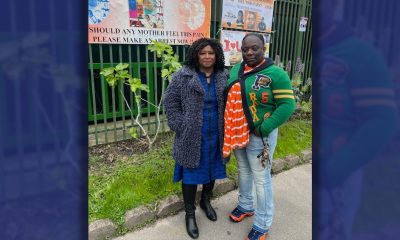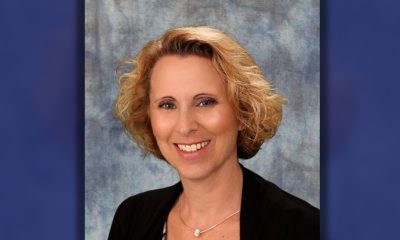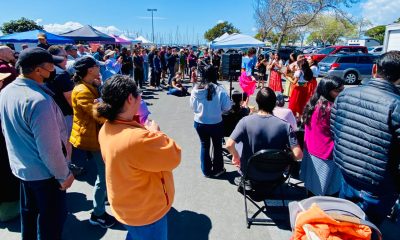Bay Area
School District Leases 2 Closed School Properties to Developer for 75 years
One property was leased for $3,000 a month, the other for $4,000 a month

The Oakland Board of Education has approved the 75-year lease of two school properties to a developer without first going through a process for public input and posting the item on the public agenda only three days before the vote.
Though agenda items in general must come before the board two times before final approval, this resolution only came up once and was approved last week in a 5-2 vote. Board President Shanthi Gonzales and Boardmember Mike Hutchinson opposed the deal.
“The first time it was made public was when it was posted on the agenda 72 hours before the board meeting, and it was during a pandemic over Zoom. There has been no public engagement around these leases at all,” said Boardmember Hutchinson in an interview with the Oakland Post.
“This has been under wraps for the last six-to-eight months,” he said.
The lease of the two properties allows the schools to be torn down and replaced by town houses and other housing, including market-rate housing, commercial space and possibly a Black cultural center and some housing for teachers.
While the supporters of the deal say they are thrilled because these developments will in include some housing for teachers and school employees, representatives of both the teachers’ union and the classified workers’ union, SEIU 1021, spoke at the meeting against the development, raising concerns that the properties were leased for a small amount of money, likely unaffordable to school employees and not utilized for educational purposes.
The leases were likely considerably below market rate for the two properties, which was for 65-years, with permission for the developers to extend the agreements for an additional 10 years.
One property, the former Tilden Child Development Center, at 4551 Steele St. near Mills College, was leased for $3,000 a month. The other property, the former site of Edward Shands Adult School, at 2455 Church St. next to the mall at Eastmont Town Center, was leased for $4,000 a month. Allowing for inflation, the cost of the leases will increase by 3% per year.
According to Hutchinson, there was only one bid for the Tilden property and the Shands site was not awarded to the highest bidder.
The Oakland Post has requested videos of the last two school board meetings, as well as copies of the final leases that were modified at last week’s board meeting. The Post also requested copies of appraisals for the two properties, the public notice that the district sent to developers and copies of all the bids submitted by developers.
As of Wednesday, the Post has not received any documents from the school district.
The developer, Eagle Environmental Construction, is a Black-owned firm. According to plans, the deal now pledges that at least 50% of the units will go to teachers and other school workers.
The plans also include space to Cypress Mandela, a local job-training program, and also for a hub for the Black Cultural Zone.
However, lease opponents are skeptical whether these promises will actually come to pass.
“There is nothing in the lease itself about providing the space to the cultural zone, and there are no penalties imposed if teacher and other workforce housing, isn’t built” Hutchinson said.
“I have serious concerns about the legality of the process,” he said. “I have no issues with Eagle Environmental Construction, and I support the Black Cultural Zone. But my responsibility is to manage our public resources and there are no guarantees that the marginal benefits will ever be provided.”
At Shands, the developers plan to build 68 units of housing and other commercial space. At the site of Tilden, the developer wants to build 20 two- and three-bedroom townhouses.
“We never really got on the same page about how we are balancing the competing goals of community benefit, revenue generation and affordable housing,” Board President Gonzales said told Oaklandside.
“Why isn’t this going to be an adult education training center? Why is this going to be turned into workforce housing when we heard our workforce can‘t afford it and don’t want to live there,” said Hutchinson at the meeting, quoted in Oaklandside.
Teacher union representative Vilma Serrano, also quoted in Oaklandside, urged the district to use the properties to rebuild adult education programs. “I ask the Board to vote no… and instead to take the time next year to be able to respond to the concerns and questions raised by (teacher union) members as well as Oakland community members.”
Board member Gary Yee, quoted in Oaklandside, supported the development because “We have an opportunity to clean up the blight, to hire local contractors, (and) to hire young people from our schools,” he said. “Sure, we have an opportunity to earn a little bit of money, but the money is the last part of this. The main thing for me is to be a good partner to our neighbors.”
Activism
Oakland Post: Week of April 24 – 30, 2024
The printed Weekly Edition of the Oakland Post: Week of April 24 – 30, 2024

To enlarge your view of this issue, use the slider, magnifying glass icon or full page icon in the lower right corner of the browser window. ![]()
Alameda County
DA Pamela Price Stands by Mom Who Lost Son to Gun Violence in Oakland
Last week, The Post published a photo showing Alameda County District Attorney Pamela Price with Carol Jones, whose son, Patrick DeMarco Scott, was gunned down by an unknown assailant in 2018.

Publisher’s note: Last week, The Post published a photo showing Alameda County District Attorney Pamela Price with Carol Jones, whose son, Patrick DeMarco Scott, was gunned down by an unknown assailant in 2018. The photo was too small for readers to see where the women were and what they were doing. Here we show Price and Jones as they complete a walk in memory of Scott. For more information and to contribute, please contact Carol Jones at 510-978-5517 at morefoundation.help@gmail.com. Courtesy photo.
Bay Area
State Controller Malia Cohen Keynote Speaker at S.F. Wealth Conference
California State Controller Malia Cohen delivered the keynote speech to over 50 business women at the Black Wealth Brunch held on March 28 at the War Memorial and Performing Arts Center at 301 Van Ness Ave. in San Francisco. The Enterprising Women Networking SF Chapter of the American Business Women’s Association (ABWA) hosted the Green Room event to launch its platform designed to close the racial wealth gap in Black and Brown communities.

By Carla Thomas
California State Controller Malia Cohen delivered the keynote speech to over 50 business women at the Black Wealth Brunch held on March 28 at the War Memorial and Performing Arts Center at 301 Van Ness Ave. in San Francisco.
The Enterprising Women Networking SF Chapter of the American Business Women’s Association (ABWA) hosted the Green Room event to launch its platform designed to close the racial wealth gap in Black and Brown communities.
“Our goal is to educate Black and Brown families in the masses about financial wellness, wealth building, and how to protect and preserve wealth,” said ABWA San Francisco Chapter President LaRonda Smith.
ABWA’s mission is to bring together businesswomen of diverse occupations and provide opportunities for them to help themselves and others grow personally and professionally through leadership, education, networking support, and national recognition.
“This day is about recognizing influential women, hearing from an accomplished woman as our keynote speaker and allowing women to come together as powerful people,” said ABWA SF Chapter Vice President Velma Landers.
More than 60 attendees dined on the culinary delights of Chef Sharon Lee of The Spot catering, which included a full soul food brunch of skewered shrimp, chicken, blackened salmon, and mac and cheese.
Cohen discussed the many economic disparities women and people of color face. From pay equity to financial literacy, Cohen shared not only statistics, but was excited about a new solution in motion which entailed partnering with Californians for Financial Education.
“I want everyone to reach their full potential,” she said. “Just a few weeks ago in Sacramento, I partnered with an organization, Californians for Financial Education.
“We gathered 990 signatures and submitted it to the [California] Secretary of State to get an initiative on the ballot that guarantees personal finance courses for every public school kid in the state of California.
“Every California student deserves an equal opportunity to learn about filing taxes, interest rates, budgets, and understanding the impact of credit scores. The way we begin to do that is to teach it,” Cohen said.
By equipping students with information, Cohen hopes to close the financial wealth gap, and give everyone an opportunity to reach their full financial potential. “They have to first be equipped with the information and education is the key. Then all we need are opportunities to step into spaces and places of power.”
Cohen went on to share that in her own upbringing, she was not guided on financial principles that could jump start her finances. “Communities of color don’t have the same information and I don’t know about you, but I did not grow up listening to my parents discussing their assets, their investments, and diversifying their portfolio. This is the kind of nomenclature and language we are trying to introduce to our future generations so we can pivot from a life of poverty so we can pivot away and never return to poverty.”
Cohen urged audience members to pass the initiative on the November 2024 ballot.
“When we come together as women, uplift women, and support women, we all win. By networking and learning together, we can continue to build generational wealth,” said Landers. “Passing a powerful initiative will ensure the next generation of California students will be empowered to make more informed financial decisions, decisions that will last them a lifetime.”
-

 Activism4 weeks ago
Activism4 weeks agoOakland Post: Week of March 27 – April 2, 2024
-

 #NNPA BlackPress4 weeks ago
#NNPA BlackPress4 weeks agoBeloved Actor and Activist Louis Cameron Gossett Jr. Dies at 87
-

 Community1 week ago
Community1 week agoFinancial Assistance Bill for Descendants of Enslaved Persons to Help Them Purchase, Own, or Maintain a Home
-

 Activism3 weeks ago
Activism3 weeks agoOakland Post: Week of April 3 – 6, 2024
-

 Business1 week ago
Business1 week agoV.P. Kamala Harris: Americans With Criminal Records Will Soon Be Eligible for SBA Loans
-

 Activism2 weeks ago
Activism2 weeks agoOakland Post: Week of April 10 – 16, 2024
-

 Community1 week ago
Community1 week agoAG Bonta Says Oakland School Leaders Should Comply with State Laws to Avoid ‘Disparate Harm’ When Closing or Merging Schools
-

 Community6 days ago
Community6 days agoOakland WNBA Player to be Inducted Into Hall of Fame



















































